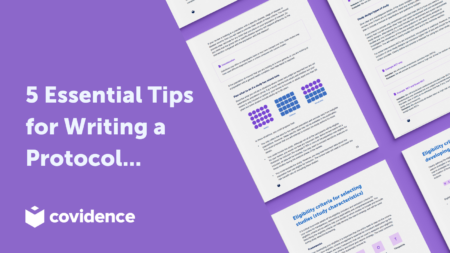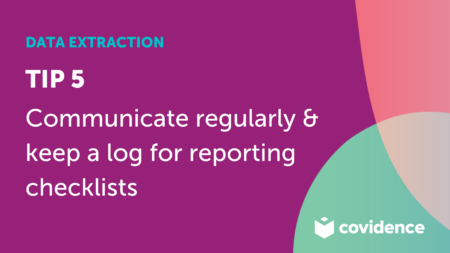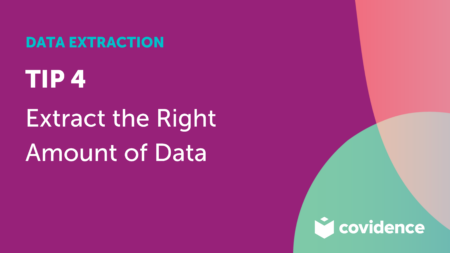Creating a systematic review can be a complex process, but with the right resources, you can navigate it smoothly from start to finish. In the Covidence Academy, we offer a series of webinars that guide you through every step of the review process using Covidence, a powerful tool designed to streamline systematic reviews. This blog post provides an overview of these webinars, highlighting how each one can help you become proficient in different stages of the review process. Whether you’re just getting started or looking to refine your skills, our webinars are here to support you every step of the way.
Webinars to get you started
Essentials of Writing a Protocol for a Systematic Review
A well-defined protocol is the blueprint for your systematic review, outlining the objectives, criteria, and methods you will use. This session will delve into best practices for developing a protocol, aligning it with your review goals, and ensuring it meets the necessary standards.
Setting up the Review in Covidence
Getting started is often the hardest part, but our “Setting up the Review in Covidence” webinar makes it easy. This session covers the basics of creating a new review project in Covidence, including how to set up your review team, customize settings, and import references. By the end of this webinar, you’ll have a solid foundation for managing your systematic review efficiently.
Screening in Covidence: A Beginner’s Guide
Screening is a critical step in the systematic review process, where you’ll determine which studies are relevant to your research question. Our “Screening in Covidence: A Beginner’s Guide” webinar walks you through the screening process, from importing references to applying inclusion and exclusion criteria. You’ll learn how to use Covidence’s intuitive interface to screen studies efficiently, track progress, and manage disagreements within your review team.
Bulk Upload of Full Texts and Full Text Retrieval
After screening titles and abstracts, the next step is to retrieve and review the full texts of potentially relevant studies. In this webinar, “Step 3: Bulk Upload of Full Texts and Full Text Retrieval,” you’ll discover how to upload full texts in bulk and navigate the full-text review stage in Covidence. This session provides practical tips for managing large volumes of documents and keeping your review organized.
Webinars on Data Extraction
Extracting Data (Extraction 1)
Data extraction is where the real work of your review begins—collecting and synthesizing data from the studies that meet your inclusion criteria. The “Extracting Data (Extraction 1)” webinar introduces you to the data extraction process in Covidence. You’ll learn how to set up extraction forms, capture key study characteristics, and efficiently collect the data you need to answer your research questions.
Exporting Data (Extraction 1) from Covidence
Once data extraction is complete, it’s time to export your data for analysis. Our “Exporting Data (Extraction 1) from Covidence” webinar guides you through the export process, showing you how to download your data in various formats compatible with popular analysis software. This session ensures that you can seamlessly move from data extraction in Covidence to data analysis and interpretation.
Extracting Data and Assessing Quality in Extraction 2
Taking data extraction a step further, the “Extracting Data and Assessing Quality in Extraction 2” webinar explores advanced features of Covidence’s data extraction tool. This session focuses on assessing the quality of included studies, which is crucial for interpreting your review’s findings. You’ll learn how to use Covidence to perform risk of bias assessments and integrate quality assessments into your data extraction process.
Webinars on Quality Control
PRISMA Reporting
The PRISMA statement is a set of guidelines for reporting systematic reviews and meta-analyses, aimed at enhancing transparency and reproducibility. In our “PRISMA Reporting” webinar, you’ll learn how to use Covidence to generate PRISMA flow diagrams and prepare your review for publication. This session covers everything from documenting your search strategy to ensuring that your review meets PRISMA standards, providing a clear and comprehensive roadmap for reporting your findings.
Visit Covidence Academy Today!
Covidence Academy’s resources are designed to equip you with the skills and knowledge needed to conduct systematic reviews from start to finish. Whether you’re new to Covidence or looking to refine your expertise, our resources are here to help. Explore our webinars, join the mailing list for updates, and take the next step in your systematic review journey with Covidence Academy.
Click here to go to Covidence Academy.
Already have an account? Sign in and start screening!


